Intel's Bean Canyon (NUC8i7BEH) Coffee Lake NUC Review - Ticking the Right Boxes
by Ganesh T S on April 3, 2019 8:00 AM EST- Posted in
- Systems
- Intel
- NUC
- UCFF
- Thunderbolt 3
- Cannon Point
- Coffee Lake-U
BAPCo SYSmark 2018
The Intel NUC8i7BEH (Bean Canyon) was evaluated using our Fall 2018 test suite for small-form factor PCs. In the first section, we will be looking at SYSmark 2018.
BAPCo's SYSmark 2018 is an application-based benchmark that uses real-world applications to replay usage patterns of business users in the areas of productivity, creativity, and responsiveness. The 'Productivity Scenario' covers office-centric activities including word processing, spreadsheet usage, financial analysis, software development, application installation, file compression, and e-mail management. The 'Creativity Scenario' represents media-centric activities such as digital photo processing, AI and ML for face recognition in photos and videos for the purpose of content creation, etc. The 'Responsiveness Scenario' evaluates the ability of the system to react in a quick manner to user inputs in areas such as application and file launches, web browsing, and multi-tasking.
Scores are meant to be compared against a reference desktop (the SYSmark 2018 calibration system, a Dell Optiplex 5050 tower with a Core i3-7100 and 4GB of DDR4-2133 memory to go with a 128GB M.2 SATA III SSD). The calibration system scores 1000 in each of the scenarios. A score of, say, 2000, would imply that the system under test is twice as fast as the reference system.
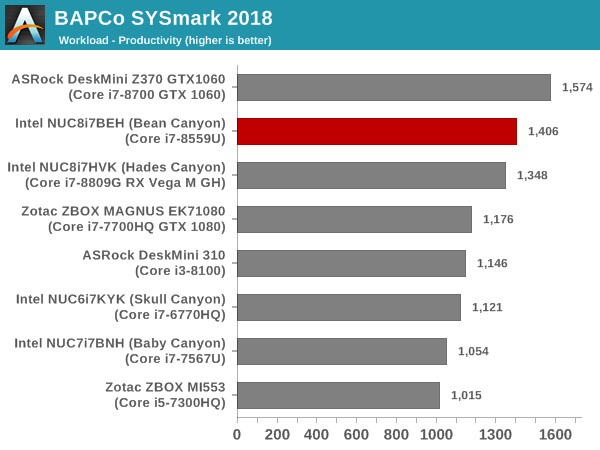
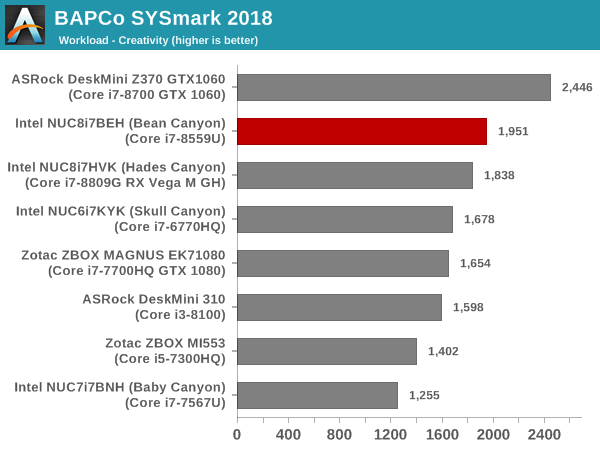
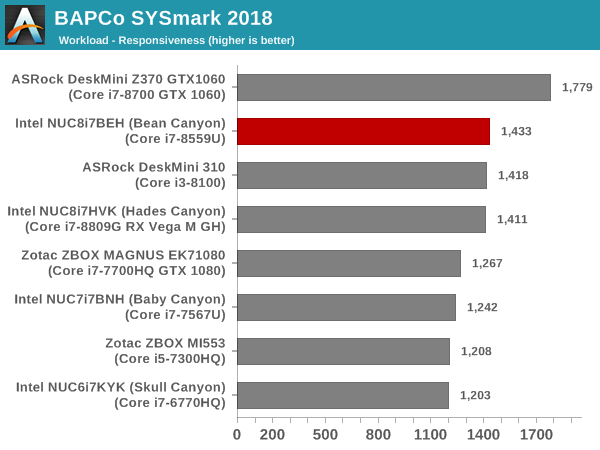
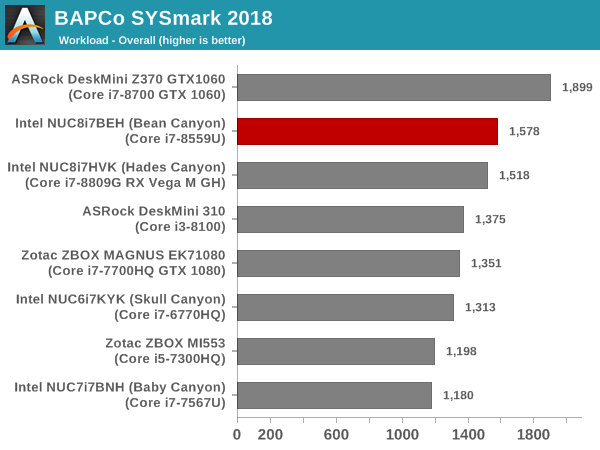
SYSmark 2018 also adds energy measurement to the mix. A high score in the SYSmark benchmarks might be nice to have, but, potential customers also need to determine the balance between power consumption and the efficiency of the system. For example, in the average office scenario, it might not be worth purchasing a noisy and power-hungry PC just because it ends up with a 2000 score in the SYSmark 2014 SE benchmarks. In order to provide a balanced perspective, SYSmark 2018 also allows vendors and decision makers to track the energy consumption during each workload. In the graphs below, we find the total energy consumed by the PC under test for a single iteration of each SYSmark 2018 workload. For reference, the calibration system consumes 5.36 Wh for productivity, 7.71 Wh for creativity, 5.61 Wh for responsiveness, and 18.68 Wh overall.
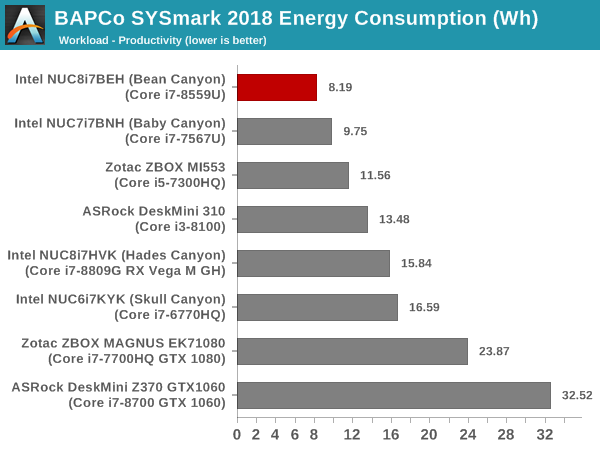
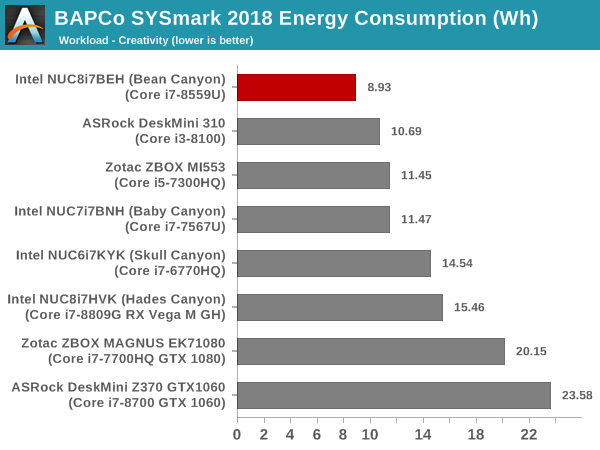
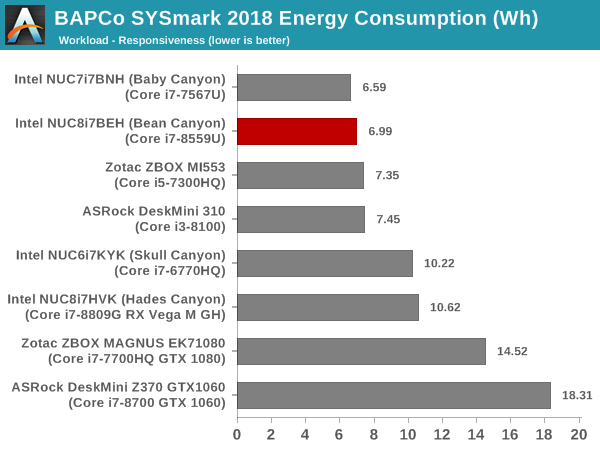
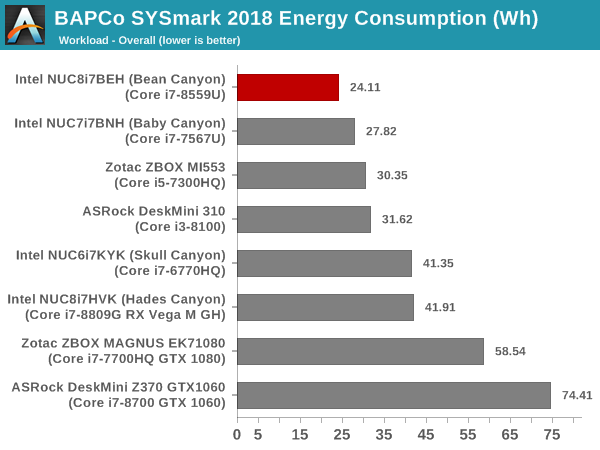
Bean Canyon turns out to be extremely energy efficient compared to almost all of the other PCs that are being compared against it. It loses the performance crown to the hexa-core Core i7-8700-equipped DeskMini Z370 GTX 1060. This is on expected lines, since the Core i7-8700 has a much higher TDP budget compared to the Core i7-8559U. The mini-STX form factor also enables the DeskMini to accommodate a better thermal solution compared to the one in the Intel NUC8i7BEH.










81 Comments
View All Comments
dontlistentome - Wednesday, April 3, 2019 - link
A few niggles still on my NUC7 -1. Firmware upgrades locked you out if you used Bitlocker (as in no rescue key, bye bye everything). At least it now warns you to suspend Bitlocker, but if lenovo can manage these upgrades seamlessly, why can't Intel?
2. Thunderbolt implementation - seems incomplete as it won't play nice with a lenovo TB3 dock (multiple other machines do) and can't be powered from it (an edge case, I know)
3. DP/HDMI implementation. Won't sleep my screen correctly so the keep coming on every few minutes. Have to turn them off at the switch.
Other than that, it does the job but will be waiting a few generations before I upgrade (or will get a Zotac Zen box instead...)
Badelhas - Wednesday, April 3, 2019 - link
I also have a Intel Nuc. How can I do a firmware upgrade?Cheers
damianrobertjones - Wednesday, April 3, 2019 - link
If everything is working... do not update.Other than that go to intel.co.uk, support, auto driver update or something like that.
eastcoast_pete - Thursday, April 4, 2019 - link
I can only second that! Updating a NUC without need can result in a "home theater" experience of the unwanted kind.MrCommunistGen - Wednesday, April 3, 2019 - link
Intel has a download center for drivers and whatnot. You can find it by doing an internet search for Intel Download Center or by just going to downloadcenter dot intel dot com (I'm not sure what the policies are here for posting URLs).The simplest way to get all the driver and BIOS updates is likely to run their latest generation update detection tool by clicking "Get started" next to where it says "Automatically update your drivers". This should be visible on the main landing page for the Downloadcenter.
If you want to do the updates manually, or you feel like the Automatic detection tool missed something you can download and apply the updates manually. To do this you'll need your NUC's model number. For example, I have a 7th Gen i5 NUC, so my model number is: NUC7i5BNH.
Ratman6161 - Thursday, April 4, 2019 - link
dontlistentome is talking about a system where the drive has been encrypted with bitlocker. The NUC is no different than any other system in this regard.niva - Friday, April 5, 2019 - link
Actually it is different, he specifically stated that other systems can handle firmware upgrades while the NUCs can't.Axltech - Wednesday, April 10, 2019 - link
fairly swift and easy to auto intel driver update app : https://downloadcenter.intel.com/download/28425/In...acme64 - Thursday, April 11, 2019 - link
f7 on the biosmikato - Thursday, April 4, 2019 - link
Yeah I was waiting for the Zotac ZBox MA551 with Ryzen 5 2400G but that never showed.